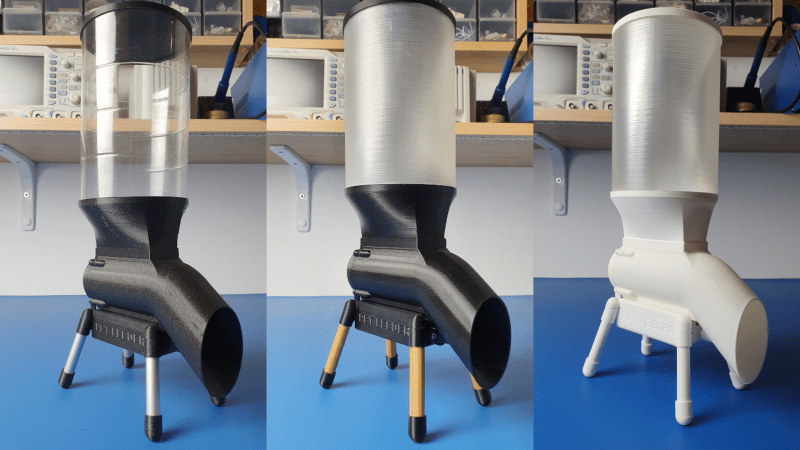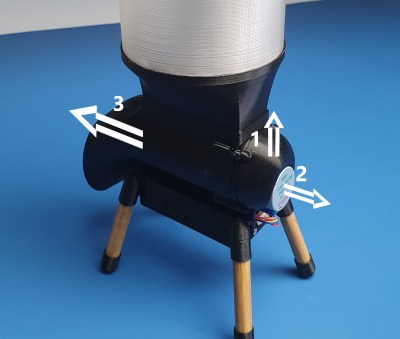Smart Pet Feeder Is Well Engineered

Having pets can sometimes be more demanding than raising kids. Pet owners obviously love and adore their pets, but anything that can be done to reduce their “chores” can be a welcome relief. One big pain point is feeding them at the right time and in the right amount, especially when it comes to cats. As the saying goes, “Dogs have Masters, Cats have Staff! ”
[Sebastian] had had it with his cat [Strachu] nagging him at odd hours for food. Luckily, [Sebastian] is a skilled maker, and his IoT Cat Feeder is not only practical, but also extremely well engineered. He designed and built it from scratch, and the beautiful, final version shows the effort he put in to it. His requirements were quite straightforward. It had to integrate with his home automation system, had to dispense food based on a regular schedule, send him a notification at other times of the day when the feeder detected the cat so he could decide if the cat deserved a special treat or not, and allow him to manually dispense cat food. Finally, he also wanted it to be easy to take apart so he could wash the parts that are in contact with food.
For the electronics, [Sebastian] designed a custom board to hold the ESP12F module and all the other associated parts. Everything, other than the stepper motor is mounted on the PCB. A PIR sensor is used for cat detection. A piezo buzzer lets the cat know that food is ready. A push button can be used to manually dispense food when required. The ESP8266 is flashed with ESPhome which allows control via simple yet powerful configuration files and control them remotely through the Home Assistant addon. If you’re interested in taking a look under the hood, [Sebastian] walks through some of the key code blocks on the ESP side, as well as the various configuration and setting options for the Home Assistant.
 But by far the most effort he needed was in getting the mechanical design perfected. He had to go through several rounds of prototype iterations – after all, his cat deserved the very best in feeder design. The basic parts of the design are simple – a stepper motor drives an auger that pushes the cat food from the main container and deposits it in the bowl. Check out the detailed assembly instructions and pictures on his blog. The best part of his design is how easy it is to take it apart the feeder for cleaning. The stepper motor is held in place by a snap fit end piece without using any screws. The main body then just slides out from the top of the electronics box. Check out [Sebastian]’s cat feeder video after the break for details.
But by far the most effort he needed was in getting the mechanical design perfected. He had to go through several rounds of prototype iterations – after all, his cat deserved the very best in feeder design. The basic parts of the design are simple – a stepper motor drives an auger that pushes the cat food from the main container and deposits it in the bowl. Check out the detailed assembly instructions and pictures on his blog. The best part of his design is how easy it is to take it apart the feeder for cleaning. The stepper motor is held in place by a snap fit end piece without using any screws. The main body then just slides out from the top of the electronics box. Check out [Sebastian]’s cat feeder video after the break for details.
If this design makes you hanker to make one for your cat too, head over to his blog post and provide your mail address and [Sebastian] will send all the files for the project.
If your cat isn’t satisfied with dry food nuggets, you probably ought to build this Automated Cat Feeder That Handles Wet Food With Aplomb.
Post a Comment